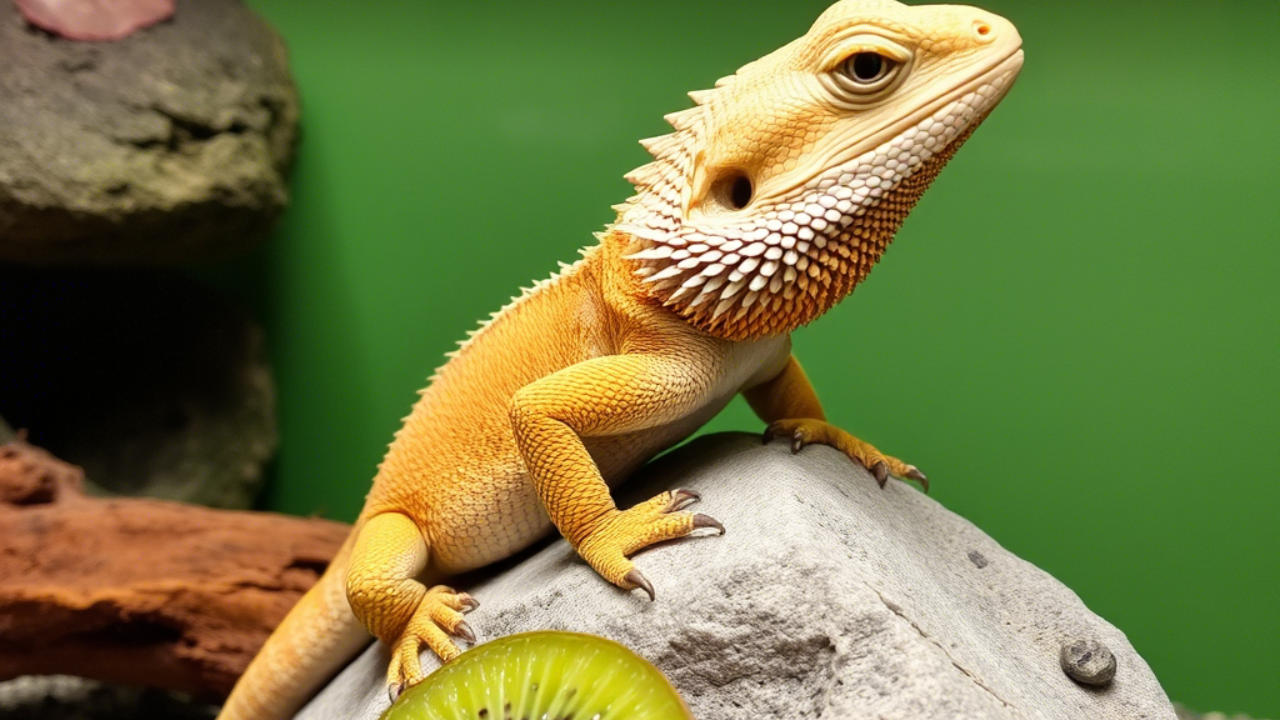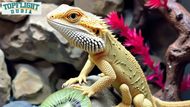Can Bearded Dragons Eat Kiwi? TopFlight Dubia Answers
Posted by Henry Moore on Apr 4th 2024
Kiwi is a delicious and nutritional fruit packed with vitamin C, fiber, and antioxidants, which makes it an appealing option in bearded dragons’ diets.
However, bearded dragon parents may wonder if kiwi is truly safe and beneficial for their pet or not.
Feeding your bearded dragon the wrong food can lead to digestive issues, imbalanced nutrition, or health problems. You don’t want to risk overfeeding sugary fruits or harming your pet unintentionally.
So, can a bearded dragon eat kiwi?
Here in the guide by TopFlight Dubia, we will dive into the benefits and risks of feeding bearded dragons kiwi, along with safe alternatives.
Can Bearded Dragons Have Kiwi?
Bearded dragons can eat kiwi, but in moderation (once or twice a month).
Nutrients Present in Kiwi
Vitamin C — 92.7mg
- Good for immune system.
- Helps with wound healing, bone health, and overall immunity.
Antioxidants
Antioxidants such as Vitamin E help protect the body from oxidative stress and support overall health.
Vitamin A — 4µg
Although kiwi is not high in vitamin A, it does contain some amount. So, vitamin A supports the following:
- Eye health
- Skin
- Immune system function
Potassium— 312mg
Helps regulate the fluid balance, nerve function, and muscle health in bearded dragons.
Fiber— 3g
Fiber helps in digestion, which is essential to maintaining a healthy gut and preventing constipation.
Calcium ( in smaller amounts) —34mg
Calcium is present in kiwi in small amounts. It is essential for bone health when combined with calcium-rich foods.
Why Bearded Dragons Could not eat Kiwi Everyday?
Moderate amounts of oxalic acid can cause metabolic bone disease in bearded dragons.
How To Feed Kiwi to Bearded Dragons
✔Organic kiwi is best.
✔Check if the kiwi is ripe
✔Wash the kiwi thoroughly
✔Slice the peel away, cut the kiwi into two halves, and then scoop out the green fruit using a spoon.
✔Cut the kiwi into tiny pieces and remove the peel from the fruit to make it easy for beardies to digest easily.
✔You can feed kiwi alone or with a salad.
Alternative to Kiwi in Dragon’s Diet
Here are the fruits that you can feed to your beardie:
Blueberries
Benefits:
- Antioxidants (in skin) promote better health
- Vitamin K1 supports bone and heart health and regulates blood clotting.
- Manganese prevents inflammation and aids in metabolism.
- Vitamin C helps strengthen the immune system, vision, growth, and reproduction.
How Often to Feed: Once a week as an occasional treat.
Apples (Without Skin)
Benefits:
- Carbohydrates keep beardies energised.
- Iron helps oxygen travel smoothly in the blood.
- Vitamins A and C strengthen the immune system, vision, growth, and reproduction.
How Often to Feed: Once a week.
Papaya
Benefits:
- Calcium maintains healthy bones, tissue, muscles, and overall wellness.
- Vitamin C helps in strengthening the immune system
- Antioxidants promote healthy cells
- Water content ensures hydration.
- Fiber aids in digestion.
- Vitamin A keeps the clear vision.
How Often to Feed: Once a week.
Pears
Benefits:
- Folate is for healthy cells and tissue.
- Copper for healthy blood.
- Potassium for heart health.
- Vitamin K for healthy bones and blood.
How Often to Feed: Once a month.
Watermelon
Benefits:
- Vitamin C and beta carotene help strengthen the immune system, vision, reproduction, and growth.
- Magnesium aids metabolism and prevents inflammation.
- Potassium helps regulate blood pressure.
How Often to Feed: Once a month.
Cantaloupe
Benefits:
- Loads of vitamin C and Beta Carotene
- Fights off illness and disease
- Have healthy reproduction
- Growth
- Folate is important for bearded dragons’ cells and tissues
How Often to Feed: Once or twice a week.
Conclusion

Bearded dragons can eat kiwi, but once or twice a month is preferred. It is essential to limit the kiwi as an occasional treat due to its high oxalic acid content, which could lead to metabolic bone disease if fed overfed.
So, to keep your bearded dragon’s diet balanced, you can include greens, insects like Dubia roaches, and occasional fruit such as blueberries, apples, and papaya.

